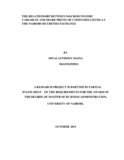| dc.description.abstract | The study was carried out to examine the relationship between macroeconomic variables
and share prices of companies listed in Nairobi Securities Exchange as proxied by NSE
20 share index, for the period covering 2002 to 2012. Macroeconomic variables include
GDP, inflation, exchange rate and interest rate analyzed using annual data covering the
period 2002 to 2012.
Secondary data was used in the study and obtained from different sources including
publications from the World Bank such as International Financial Statistics (IFS), Central
Bureau of Statistics, Central Bank and various publications of the University of Nairobi.
The study first found it necessary to determine the trend of share prices for the year 2002-
2012. This was to determine the overall share price performance as a result of the
economic situation in the country over a range of time period. From the study findings, it
is construable that in first seven years from 2002 to 2008 the share index showed upward
trend. But in 2009, due to uncertainties it showed a downward trend but after that period,
the trend goes upward again. The positive upward trend is as a result of stability in
macroeconomic variables under consideration i.e. interest rate, gross domestic product,
exchange rate and inflation rate.
The study also shows that share prices are affected by macroeconomic variables and this
implies that macroeconomic variables GDP, INT, INF and EXR are very crucial in
determining share price index in an economy. From the Correlation coefficients results,
GDP, INT, INF and EXR posted a positive relationship with the share prices. Also. The
correlation matrix indicates that gross domestic product is highly and positively
correlated with share price index as well as interest, inflation and exchange rates.
Logarithm of real values was used to reduce the statistical figures in to meaningful values
for easy interpretation. The use of the natural log also reduces the heteroskedasticity and
also provided a better fit for outliers within the distribution.
With these results, it is important that monetary managers should adopt suitable monetary
measures to control inflation, so that the volatility of the share market can be reduced.
The increase in Gross Domestic Product can play significant positive role in development
of the capital market. Policy makers need to be careful too when trying to influence the
economy through changes in macroeconomic variables such as interest rate as this may
inadvertently depress the stock market and curtail capital formation which itself would
lead to further slowdown of the economy. | en |

